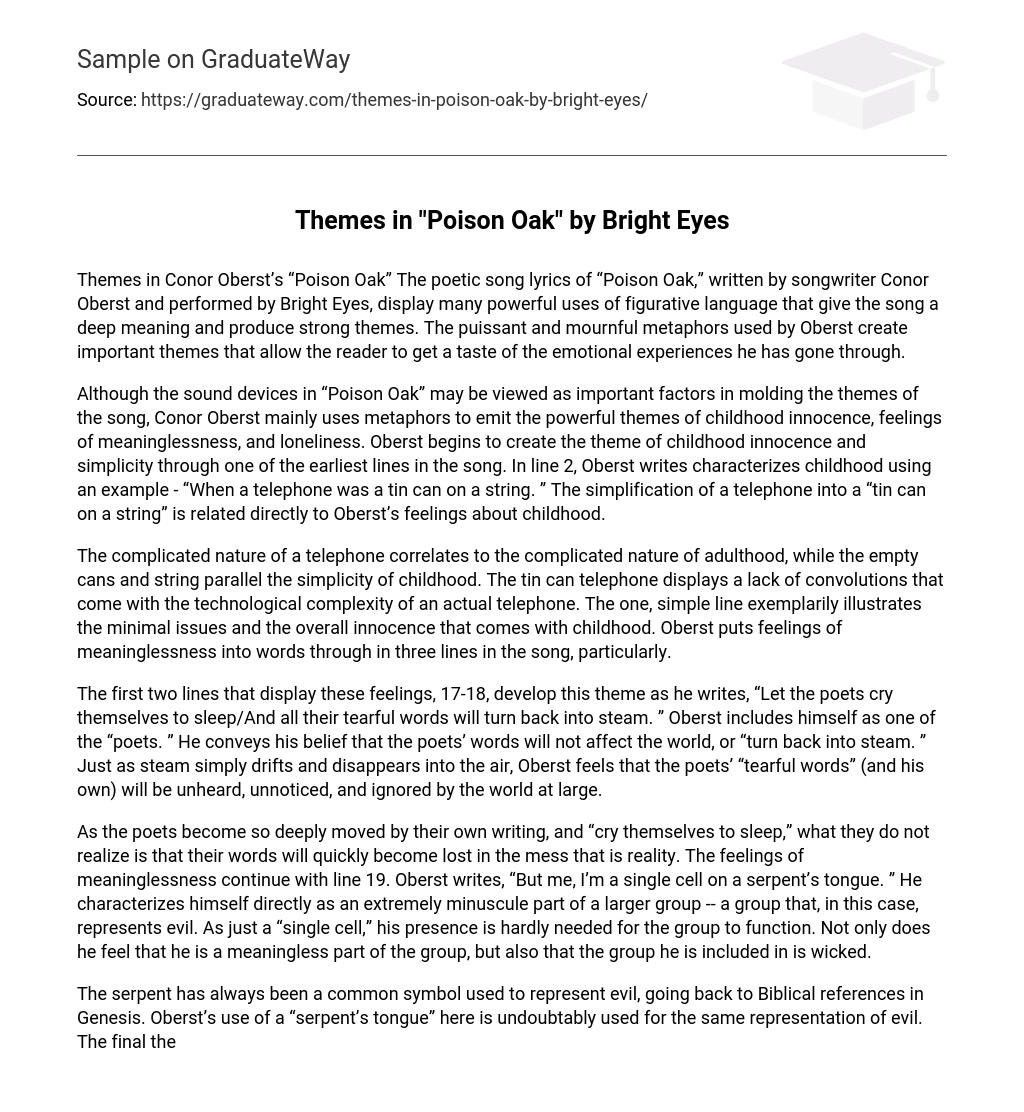Themes in Conor Oberst’s “Poison Oak” The poetic song lyrics of “Poison Oak,” written by songwriter Conor Oberst and performed by Bright Eyes, display many powerful uses of figurative language that give the song a deep meaning and produce strong themes. The puissant and mournful metaphors used by Oberst create important themes that allow the reader to get a taste of the emotional experiences he has gone through.
Although the sound devices in “Poison Oak” may be viewed as important factors in molding the themes of the song, Conor Oberst mainly uses metaphors to emit the powerful themes of childhood innocence, feelings of meaninglessness, and loneliness. Oberst begins to create the theme of childhood innocence and simplicity through one of the earliest lines in the song. In line 2, Oberst writes characterizes childhood using an example – “When a telephone was a tin can on a string. ” The simplification of a telephone into a “tin can on a string” is related directly to Oberst’s feelings about childhood.
The complicated nature of a telephone correlates to the complicated nature of adulthood, while the empty cans and string parallel the simplicity of childhood. The tin can telephone displays a lack of convolutions that come with the technological complexity of an actual telephone. The one, simple line exemplarily illustrates the minimal issues and the overall innocence that comes with childhood. Oberst puts feelings of meaninglessness into words through in three lines in the song, particularly.
The first two lines that display these feelings, 17-18, develop this theme as he writes, “Let the poets cry themselves to sleep/And all their tearful words will turn back into steam. ” Oberst includes himself as one of the “poets. ” He conveys his belief that the poets’ words will not affect the world, or “turn back into steam. ” Just as steam simply drifts and disappears into the air, Oberst feels that the poets’ “tearful words” (and his own) will be unheard, unnoticed, and ignored by the world at large.
As the poets become so deeply moved by their own writing, and “cry themselves to sleep,” what they do not realize is that their words will quickly become lost in the mess that is reality. The feelings of meaninglessness continue with line 19. Oberst writes, “But me, I’m a single cell on a serpent’s tongue. ” He characterizes himself directly as an extremely minuscule part of a larger group — a group that, in this case, represents evil. As just a “single cell,” his presence is hardly needed for the group to function. Not only does he feel that he is a meaningless part of the group, but also that the group he is included in is wicked.
The serpent has always been a common symbol used to represent evil, going back to Biblical references in Genesis. Oberst’s use of a “serpent’s tongue” here is undoubtably used for the same representation of evil. The final theme, loneliness, is suggested by multiple lines near the end of the song. The first to express loneliness is line 21, which reads, “And I’m glad you got away, but I’m still stuck out here. ” Oberst is referencing an unnamed person here, who has apparently “gotten away,” leaving Oberst behind, alone. Oberst could be suggesting that his companion has passed away, and has therefore “gotten away” from life itself.
Oberst gives life a negative connotation when he writes that he is “still stuck out here. ” He uses the word “stuck” to indicate that he feels trapped by life, and that he, too, would escape from it if he could. He cannot, and is left in life to continue facing reality. The second indication of the loneliness theme appears in lines 27-28, which read, “And when I press the keys, it all gets reversed/The sound of loneliness makes me happier. ” Oberst explains that he is experiencing a reversal of the typical idea that loneliness and sadness go hand-in-hand.
Loneliness is bringing him happiness now. Perhaps it is the fact that he has now come to fully realize his loneliness that is bringing him what he considers to be happiness. He has accepted his loneliness and apparently begins to embrace it as a part of himself. “Poison Oak,” by Conor Oberst, displays many powerful uses of metaphors to convey the themes of childhood innocence, meaninglessness, and loneliness. The metaphors help to allow the reader to experience Oberst’s perspective and feelings concerning these themes.





